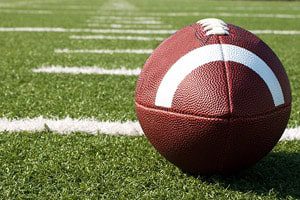
The National Football League (NFL) has initiated a probe into the New England Patriots following allegations that the team intentionally used overly deflated footballs in their recent drubbing against the Indianapolis Colts in the American Football Conference (AFC) Championship Game, according to an NFL spokesman. The Patriots 45-7 win is bringing them to this Sunday’s […]

DeflateGate’s Effects Impact Legal Gambling & the Economy
The National Football League (NFL) has initiated a probe into the New England Patriots following allegations that the team intentionally used overly deflated footballs in their recent drubbing against the Indianapolis Colts in the American Football Conference (AFC) Championship Game, according to an NFL spokesman. The Patriots 45-7 win is bringing them to this Sunday’s Super Bowl.
Bob Kravitz of WTHR in Indianapolis, Indiana broke the “DeflateGate” story noting that the referee removed a ball from play, weighing the ball during an oddly placed mid-game delay during New England’s first drive of the second half. Ultimately, the referee swapped the ball out.
Should the probe confirm the allegations that the balls were intentionally deflated to gain an advantage, the Patriots stand a chance of losing draft picks, Kravitz noted. This is not the first time the Patriots have been involved in game scandals. In 2008, the Patriots received a large fine and were docked a first-round draft pick for their involvement in so-called “SpyGate.” Other allegations of ball deflating have been made in the past. In 2012, at the college level, a student manager with the University of Southern California (USC) was dismissed following allegations he deflated balls during a contest.
Under the NFL’s rules, footballs must be inflated between 12.5 and 13.5 pounds per square inch. Both teams provide 12 primary balls each for testing prior to play. The referee tests the 24 balls two hours and 15 minutes prior to kickoff.
The intentional deflation of footballs is not unknown and when a football is overly deflated, the player’s grip on the ball is greatly improved and the ball becomes easier to hold, catch, and throw, all of which assist the offense. This is noteworthy given that teams use their own balls on offense.
At issue with DeflateGate is the scandal’s effect on legal sports betting, such as on the Internet and in Las Vegas, Nevada. Clearly, the scandal extends well beyond the game, potentially impacting legal, sanctioned betting operations as well as on the economy in the form of lost jobs, revenue, and taxes.
According to LegalBettingOnline, sports betting is the predicting of “sports results while placing a wager on the outcome according to an agreed upon set of rules or laws.” Wagers may be made against another bettor, a “house,” a “bookie,” or another entity. Legal forms of online sports betting may vary from state to state and by country, with Internet betting having become a multi-million-dollar industry. Sports betting is the most popular form of legalized online betting. In the United States, sports gambling is not permitted on the federal level, with Nevada among the few states that permit such betting. In fact, the American Gaming Association (AGA) notes that only Nevada, Delaware, Oregon, and Montana permit any form of sports betting. Most of the legal sports betting, however, occurs in Las Vegas. Although Nevada only permits bets verifiable in the box score, online and offshore betting does not have the same restrictions.
The Department of Justice indicates that individual states may “determine their own destiny regarding online gambling”; however, “sports betting seems to be the exception to this rule.” In the U.S., the only legal option for online sportsbook wagering is through legally licensed and regulated online sportsbooks, which are located offshore and “operated under the regulatory oversight of a governing jurisdiction which has already legalized online sports betting for their territory, legally allowing them to offer their services to bettors around the world, including those in the United States.”
In 2014, legal bettors spent $119.4 million on wagers, according to The Week, as well as so-called “prop bets.” This year, gamblers will likely pick from more than 500 various “prop bets,” such as what the opening coin toss will be or which team will score first. Props may involve statistical research, historical analysis, and expectations of market behavior. One may expect that these prop bets might now involve Deflate-Gate. For example, how many times during a broadcast will deflated footballs be mentioned?
The first-ever estimates released by the AGA in January 2015 revealed that, while Americans make $100 million in legal bets on the Super Bowl annually, $3.8 billion in illegal bets are made. CitizenLink notes that about 86 percent of Americans have gambled at least once during their lives.


